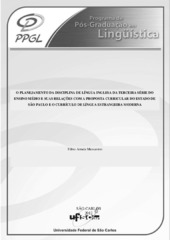| dc.contributor.author | Massarotto, Fábio Arruda | |
| dc.date.accessioned | 2016-06-02T20:25:14Z | |
| dc.date.available | 2012-08-31 | |
| dc.date.available | 2016-06-02T20:25:14Z | |
| dc.date.issued | 2012-05-24 | |
| dc.identifier.citation | MASSAROTTO, Fábio Arruda. O planejamento da disciplina de língua inglesa da terceira série do ensino médio e suas relações com a proposta curricular do estado de São Paulo e o currículo de Língua Estrangeira Moderna. 2012. 145 f. Dissertação (Mestrado em Ciências Humanas) - Universidade Federal de São Carlos, São Carlos, 2012. | por |
| dc.identifier.uri | https://repositorio.ufscar.br/handle/ufscar/5744 | |
| dc.description.abstract | In this bibliographic and documental research, our aim is to investigate what kind of relationship may be established between the current Curricular Proposal (CP) of the State of São Paulo, the Modern Foreign Language Curriculum (MFLC) and the English course planning which underlies the Teacher s books (TBs) and Student s books (SBs) designed by São Paulo Department of Education for the third year of high school. The central argument of this study is to understand those documents, since they serve as orientation for teacher practice in São Paulo public schools. We assume that teachers should not be mere implementers, but they need to develop a critical eye toward the theoretical bases that underlie those proposals, as it is possible the occurrence of divergences among them. In order to achieve our aim, we drew a plan divided into three parts. First, we turned to authors who address issues related to concepts of language, learning, literacy, genders and course planning so that we could build the theoretical references that would guide us to answer the first question of this research: How is the underlying planning of the new São Paulo teaching materials (TBs and SBs) for the third year of high school constituted? Then, we described and analyzed the CP, the MFLC and the course planning. We used categories in order to understand the organization of the latter and establish the relationship with the first and second documents: type of course planning, grammar and vocabulary teaching, reading and writing teaching, assessment and view of language learning prioritized in the course planning. We finished the research by trying to answer the second question of this investigation: What kind of relationship may be established among the CP, the MFLC and the course planning embodied in the Teacher s and Student s books? Through the analysis we could discover that there are divergences between the theoretical and methodological aspects idealized in both CP and MFLC and the materialized ones in the course planning, especially when it comes to the teaching of reading, writing, grammar and vocabulary. | eng |
| dc.format | application/pdf | por |
| dc.language | por | por |
| dc.publisher | Universidade Federal de São Carlos | por |
| dc.rights | Acesso Aberto | por |
| dc.subject | Planejamento de curso de línguas | por |
| dc.subject | Currículo de Língua Estrangeira Moderna (CLEM) | por |
| dc.subject | língua inglesa (LI) | por |
| dc.subject | Ensino Médio | por |
| dc.subject | Letramento | por |
| dc.subject | Linguística aplicada | por |
| dc.subject | Material didático | por |
| dc.subject | Course planning | eng |
| dc.subject | Modern Foreign Language Curriculum (MFLC) | eng |
| dc.subject | English | eng |
| dc.subject | High school | eng |
| dc.subject | Literacy | eng |
| dc.title | O planejamento da disciplina de língua inglesa da terceira série do ensino médio e suas relações com a proposta curricular do estado de São Paulo e o currículo de Língua Estrangeira Moderna | por |
| dc.type | Dissertação | por |
| dc.contributor.advisor1 | Barbirato, Rita de Cassia | |
| dc.contributor.advisor1Lattes | http://lattes.cnpq.br/6962819573963727 | por |
| dc.description.resumo | Visamos, a partir desta pesquisa de natureza bibliográfica e documental, investigar que relação pode ser estabelecida entre a Proposta Curricular (PC) do Estado de São Paulo, o Currículo de Língua Estrangeira Moderna (CLEM) e o planejamento de língua inglesa (LI) subjacente aos Cadernos do Professor (CPs) e do Aluno (CAs) da terceira série do Ensino Médio. O argumento central deste trabalho é compreendê-la, uma vez que tais propostas curriculares servem de norteadores para a prática do professor de LI da rede pública estadual. Partimos do pressuposto de que o professor não deve ser mero implementador, mas precisa desenvolver um olhar crítico em relação às bases teórico-metodológicas que fundamentam esses documentos, visto que é possível a ocorrência de divergências. Para atingirmos nosso objetivo, traçamos um plano, o qual foi dividido em três fases. Primeiramente, recorremos a autores que abordam questões relacionadas a concepções de língua(gem), aprendizagem, letramento, gêneros e planejamento de cursos de línguas para construirmos a ancoragem teórica que nos orientasse a responder à primeira questão de pesquisa: Como se constitui o planejamento subjacente aos cadernos de LI (CPs e CAs) da terceira série do Ensino Médio? Em seguida, descrevemos e analisamos a PC, o CLEM e o planejamento. Utilizamos categorias para que pudéssemos compreender a constituição deste último e estabelecer a relação com os dois primeiros: tipo de planejamento, ensino de gramática e vocabulário, ensino de leitura e escrita, avaliação e visão de linguagem e aprendizagem priorizada no planejamento. Finalizamos buscando responder à segunda questão: Que relação pode ser estabelecida entre a PC, o CLEM e o planejamento concretizado nos CPs e CAs? Na análise, evidenciamos que há divergências entre as perspectivas teórico-metodológicas idealizadas na PC e no CLEM e as materializadas no planejamento, especialmente no que se refere ao ensino de leitura, escrita, gramática e vocabulário. | por |
| dc.publisher.country | BR | por |
| dc.publisher.initials | UFSCar | por |
| dc.publisher.program | Programa de Pós-Graduação em Linguística - PPGL | por |
| dc.subject.cnpq | LINGUISTICA, LETRAS E ARTES::LINGUISTICA | por |
| dc.contributor.authorlattes | http://lattes.cnpq.br/7343688723603671 | por |
